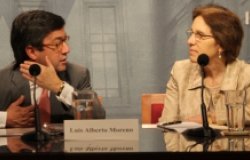La Alianza del Pacífico: Un largo camino por recorrer hacia la integración
The Pacific Alliance, formed in 2012 by Chile, Colombia, Mexico, and Peru, represents one of the most ambitious processes of regional economic integration in decades. The four Alliance countries have Latin America’s most competitive and open economies. In only two years, the Pacific Alliance members have achieved remarkable progress, integrating their stock markets, lowering trade barriers, and eliminating visas among member countries.
That said, a new study commissioned by the Latin American Program and authored by Adrián Blanco demonstrates that levels of trade and investment among Pacific Alliance countries remain low, superseded by member countries’ economic relationships with the United States, China, the European Union, and the countries of MERCOSUR. To deepen and accelerate the process of integration among Alliance members, the study argues for additional public policies in the areas of infrastructure and logistics development, education and human capital formation, and the creation of production clusters.
The report (in Spanish) is available for download below.
About the Author
Adrián Blanco Estévez

Latin America Program
The Wilson Center’s prestigious Latin America Program provides non-partisan expertise to a broad community of decision makers in the United States and Latin America on critical policy issues facing the Hemisphere. The Program provides insightful and actionable research for policymakers, private sector leaders, journalists, and public intellectuals in the United States and Latin America. To bridge the gap between scholarship and policy action, it fosters new inquiry, sponsors high-level public and private meetings among multiple stakeholders, and explores policy options to improve outcomes for citizens throughout the Americas. Drawing on the Wilson Center’s strength as the nation’s key non-partisan policy forum, the Program serves as a trusted source of analysis and a vital point of contact between the worlds of scholarship and action. Read more

Mexico Institute
The Mexico Institute seeks to improve understanding, communication, and cooperation between Mexico and the United States by promoting original research, encouraging public discussion, and proposing policy options for enhancing the bilateral relationship. A binational Advisory Board, chaired by Luis Téllez and Earl Anthony Wayne, oversees the work of the Mexico Institute. Read more








